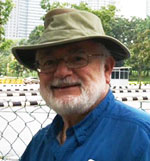By Oliver B. Pollak, Ph.D.

RICHMOND, California — COVID has changed how we mourn. Attending funerals in temples, synagogues, and decamping to the cemetery were often followed by a meal of consolation and sitting shiva. Out of town family labored to attend. Minyan and yahrzeit mark the calendar.
COVID made zooming and streaming funerals commonplace and engaging. It encouraged and allowed honoring the deceased and their family by people who under pre-pandemic conditions would not normally have been among the assembled mourners.
COVID caused funeral homes and cemeteries to delay last rites. Out of town family had difficulty making flights. Gatherings of the bereaved assumed the status of potential super spreaders. The deceased stayed on ice. Close family members were distressed by indeterminacy and lack of closure. Clergy were torn between scriptural tradition, congregation expectations, and CDC public gathering and travel guidelines.
My older cousin Ralph died in October 2020 at the age 83. He fled Nazi Germany and arrived in New York in 1939. COVID restricted the attendees to family members who traveled from San Diego and Reno to the San Francisco Bay Area. The Rabbi held a socially distanced ceremony at the cemetery. Hugging, embracing, and cheek kissing, almost universal signs of joy, fellowship, sympathy, empathy and support, “we are here for you,” were made awkward by masks and infectious fear. It deepened the sense of loss. A larger gathering huddled around their computer screens to exchange memories of Ralph. His death left me as the oldest of the surviving grandchildren of Holocaust survivors Felix and Nellie Bachmann.
Omaha’s native son, philosopher Saul Kripke, son of Rabbi and Dorothy Kripke, died in September 2022 at the age of 81. About 40 people zoomed to share their memories of Saul and his impact on their lives and scholarship. Family, friends, and colleagues from around the country paid tribute. Sitting in Richmond, California, I recognized several Omahans. Among the viewers was Sam Roberts, who I guessed, was the New York Times obituarist. He had written the obituary of Madeline Kripke, a dictionary specialist bookseller, Saul’s sister, in 2020. Sure enough, Saul’s half page obit appeared in the NYT written by Sam Roberts.
Saul’s funeral was zoomed from the cemetery. Rabbi and cantor intoned the traditional and familiar prayers and melodies. The camera captured the lowering of the casket into the ground and mourners shoveling earth over the casket. These observances are not on YouTube, yet.
Arnold “Tuffy” Epstein, an Omaha musician and teacher, died in Omaha, December 2022, at the age of 87. He performed thousands of enjoyable gigs, simchas, including the wedding receptions of our sons. He played wind instruments at Omaha’s Beth El Synagogue Friday night services, accompanied by pianist Anna Mosenkis. Despite failing health Tuffy taught music virtually up to the day he died. Helen Cook Epstein, Tuffy’s wife of 65 years, was surrounded by her family. Two daughters, a younger brother, a cousin and the rabbi contributed a wonderful homage. The meal of consolation was at the synagogue.
I have been a haphazard newspaper obituary reader and article clipper since the 1960s. Local newspapers, the New York Times, Jewish newspapers, quarterly alumni magazines and professional print and online newsletters feed the accumulation. Karen and I receive emails from Beth El Synagogue, “In Memoriam – Barukh Dayan Haemet” (blessed is the true judge), announcing deaths of Jews connected to Nebraska. We recognize the names of contemporaries and make donations.
My files are predominantly of dead historians. I am not morbidly obsessed, but historians naturally note the passing of time and people. Necrological records, family trees and court probate files provide details that enrich our understanding of the past. I take pictures at cemeteries of stone and metal death markers and ponder their words, epigraphy and iconography and who is resting on either side. Obituaries disclose amazing fetes of creativity, achievement, military service, public service, overcoming handicaps, declining years, and the number of grand and great grandchildren. Obits have grown to incorporate the decedents flaws as well as their perfections. I’ve noticed in the last six months three obituaries specifically mentioned that the decedent belonged to the Jewish Conservative movement, something I don’t recall being mentioned in my over half century of reading obituaries.
Being remotely tuned into distant funerals has added dimensions, including making us closer to shared grieving. Emotions in the privacy of your home may differ from emotions with people around you. Revelations about the deceased such as conquering alcoholism, tragic loss of a child, and economic struggles, highlight the human spirit of courage and perseverance.
*
Oliver B. Pollak, Ph.D., J.D., professor emeritus of history at the University of Nebraska at Omaha, a lawyer, and a member of the Institute of Historical Study, is a correspondent based in Richmond, California. He may be contacted at oliver.pollak@sdjewishworld.com